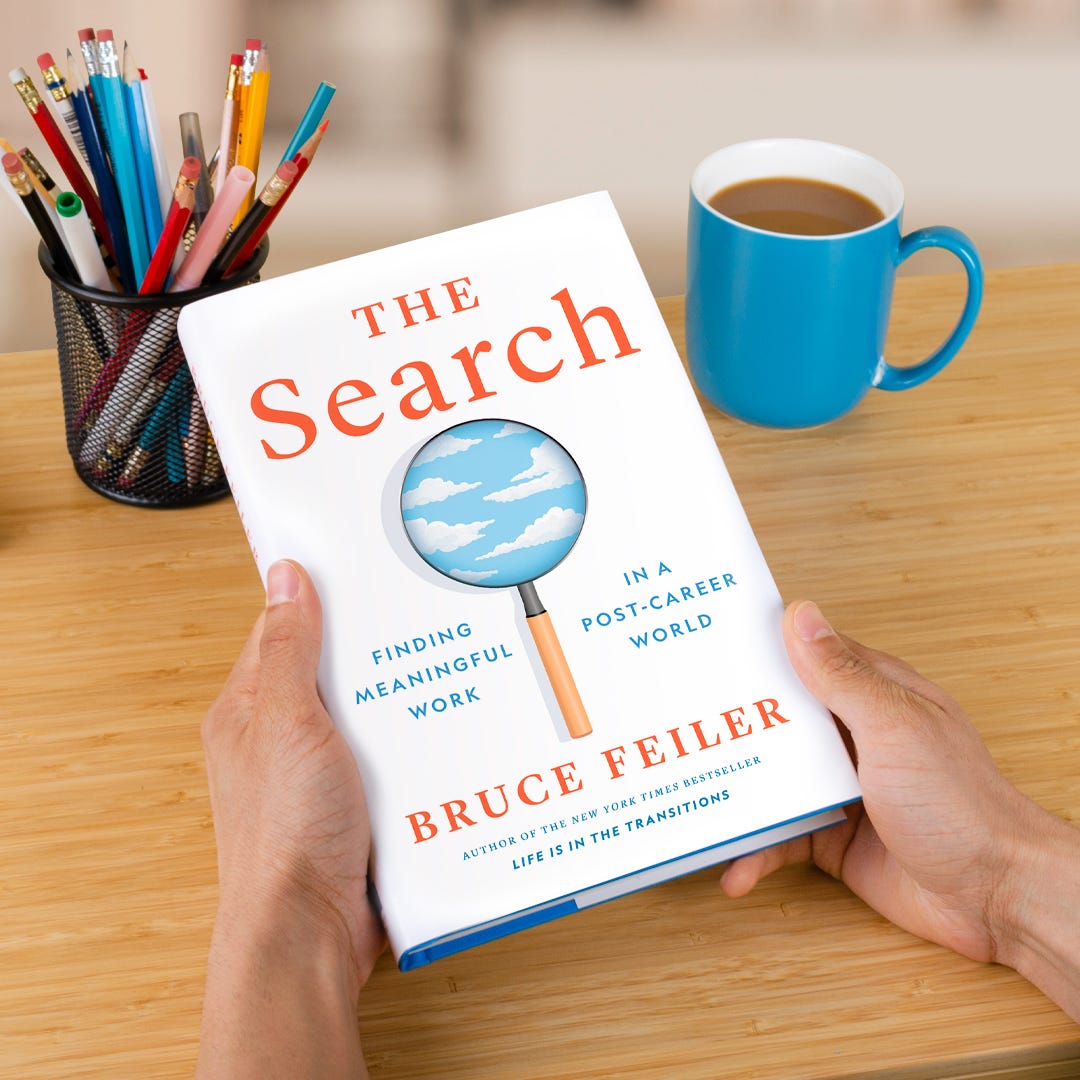New Research Confirms Your Life Flashes Before Your Eyes When You Die
Life Review Is So Important That It’s the Last Thing We Do When We’re Alive
Thanks for reading The Nonlinear Life, a reader-supported newsletter about navigating life's ups and downs. If you're new around here, learn about me, or check out our introductory post. And if you enjoyed this article, please subscribe or share with a friend.
___
Tomorrow is the two-year anniversary of my father’s death. During these intervening years, I feel like I’ve learned more about death and dying than I did in decades when I was already thinking a lot about death and dying. Memorable takeaways including discovering the frightening evidence of how losing a parent affects adult siblings along with the helpful advice about the one thing you shouldn’t do when you’re sad. [If you want to read my eulogy for my father, I posted it on The Nonlinear Life.]
But one of the biggest sources of gratitude I hold onto is that I was able to use the long runway of my father’s decline to capture an entire book of memories that would otherwise have been lost. I’ve written a lot about the eight years I spent sending my father an email every Monday morning with a question about his life and how his answers changed all of our lives, so I won’t go into that story here [if you’re new around here and want to learn more, please check out this earlier post, my book Life Is in the Transitions, or my recent TED Talk].
What I will say is that my experience plunged me deep into the world of narrative gerontology and how redemptive it is for people nearing the end of their lives to reflect and reprocess memories from earlier in their lives. So you can imagine how stunned I was to read about groundbreaking new research that the proverbial piece of folk wisdom—my life flashed before my eyes—is actually true and is itself an act of life narrativization.
Please let me explain.
In a paper called “Time, Story, and Wisdom: Emerging Themes in Narrative Gerontology,” published in 2004, William Randall and Gary Kenyon of St. Thomas University described narrative gerontology as “an emerging sub-field of the study of aging.” It is less a body of knowledge, they say, and more a perspective, a way of looking at “the inside” of aging.
A central insight, they go on to share, is that humans are fundamentally storytelling creatures. We are narrative beings, biographical as well as biological. As literary scholar Barbara Hardy has written, “We dream in narrative, daydream in narrative, remember, anticipate, hope, despair, believe, doubt, plan, revise, criticize, construct, gossip, learn, hate, and love in narrative.”
We are a species of storytellers.
The purpose of all this storytelling is that narratives are how we make meaning of all the splintered shards of memory and existence that we accumulate every day. In the case of aging, all this storytelling helps us make meaning out of the sometimes disordered parts of our lives. Randall and Kenyon make the lovely point that “growing older, versus merely getting older, may hinge on, among other things, our discovery—creation of a coherent life narrative.”
As James Birren, the founder of gerontology, explained to me on a visit to his home some years ago, lives are made up of memories, but when those memories remain episodic and disconnected, their impact dissipates. Countless studies have found that carefully cultivating our memories improves quality of life, increases self-esteem, heightens well-being, elevates our sense of serenity, even reduces clinical depression.
The work Dr. Birren was most proud of, he said, was recognizing the healing power of stories for older people. As we age, we feel a greater sense of alienation, loneliness, and loss of purpose; we also feel bored. Storytelling ameliorates those feelings. By climbing to a summit and peering out on our lives, we feel closer to events that might seem faraway and to people who might seem long forgotten.
Anyone can perform this life review at any age, but for older people it’s downright essential. Earlier in our lives we use stories to better learn who we are; later in our lives we use stories to better learn who we were. In both cases, storytelling helps prepare us for the future.
It’s this ever-present instinct toward life review and narrativization that makes the new revelations about “life flashing before our eyes” so tantalizing.
The story begins in 2016 with a scientific accident. As described in a paper published in Frontiers in Aging Neuroscience, written by Raul Vicente of the Max Planck Institute for Brain Research, and 12 colleagues, an 87-year-old epileptic an arrived at an emergency room after a fall. He had bleeding in his skull. In the middle of an EEG scan of his brain, the man died, giving the medical professionals a completely unplanned and unexpected view of his brain activity during his death. The man suffered a heart attack, the paper reports, and since he had signed a do-not-resuscitate statement, doctors did not intervene.
But what happened next is what’s eye-popping. The scan found that the man’s brain seemed to replay memories in the 30 seconds before and after his heart stopped beating.
“This is why it’s so rare, because you can’t plan this,” Ajmal Zemmar, one of the co-authors of the study, told Insider. “No healthy human is going to have an EEG before they die, and in no sick patient are we going to know when they’re going to die to record these signals.”
Specifically, the scan showed that 15 seconds before the man’s heart stopped beating, he experienced a surge of high-frequency brainwaves called gamma oscillations, as well as a series of lower-frequency theta, delta, alpha, and beta oscillations. These patterns are connected to dreaming, concentrating, meditating, and memory retrieval.
Put more directly, as the paper does, “flashbacks during near-death experiences (NDEs)” have also been linked to this “oscillatory activity” as have real life memory recall.
The researchers were cautious, as is their professional obligation. They spent years looking for a similar case, but could not find one. "It is very hard to make claims with one case, especially when the case has bleeding, seizures, and swelling," Zemmar said. “But what we can claim is that we have signals just before death and just after the heart stops like those that happen in the healthy human when they dream or memorize or meditate.”
As others have noted, this account confirms centuries of reports of periods of high clarity just before a person dies. Dying people often have “paradoxical lucidity with heightened consciousness,” said Dr. Sam Parnia, the author of What Happens When We Die. “This includes a meaningful, purposeful review of their entire lives, which encompasses all their actions, intentions and thoughts — in essence their humanity — towards others.”
In other words, life review is so important; making meaning from your memories is so important; creating a unifying narrative of your existence is so important that it just may be the last thing we do when we’re alive – and even the first thing we do after we die.
All the more reason to undertake that process when you’re living, when you have more time to act on what you’ve learned and more time to put your story to good use.
☀
Thank you for reading The Nonlinear Life. This is a reader supported newsletter. You can help by ordering a copy of my new book. Click on the photo below to learn more.
Meanwhile, please help us grow the community by subscribing, sharing, and commenting below. If you'd like to do a storytelling project with a loved one similar to the one I did with my father, click here to learn more.
You might enjoy reading these posts:
Why It’s Suddenly a Good Time to Be Old
The New Rules of Success in a Post-Career World
Or, you can contact me directly.









Bruce, What a great substack message. As a retired occupational therapist with focus on neurology and trauma/surgery of the upper extremity, one learns to treat patients using connections between the spine/brain and fine motor skills, proprioception and cognition. A glimpse of the brain showing us the last few seconds between life and death indicates the complex workings of the brain as an organ and its important connection between our bodies and our souls. Thank you so much..
When I was 6 I'm 55 today. I had an imaginary friend Bobby. In the 1974 we had a f5 tornado. We were exactly 2 blocks away from ground zero. That same year my dad accidentally ran me over. I had jumped onto the side mirror. It was a 10 ton truck fully loaded. When I fell it was like I slid into second base. So the dualies starting at my knee. Ran up my thigh and across my back. Off my shoulder blade missing my head by Inches. I believe Bobby was my guardian angel. Making sure the truck didn't run over sideways. Across my stomach Dr. Said would of killed me instantly. Well shattered pelvis 4 broken ribs ruptured spleen and pancreas. I died 3x on operating table. I feel like the first death was my life flashed in front of my eyes. Its like over my lifetime I've had gut feelings about something wasn't right about this person or that person. When my life flashed before my eyes it was so fast I don't remember it. But over time it seems to come to me. Like dreams and things. I also feel like the 2nd time I died I seen into heaven. Like Moses had seen the promised land before he died. In a sense I feel like I had seen the promised land. It's like I know what happens after death. But I don't know everything it just feels like I know part of it. I always wondered If someone would hypnotized me maybe I could get some answers. I feel like the 3rd time I died I seen how I died. And I wouldn't know about it until I would be real close to death.